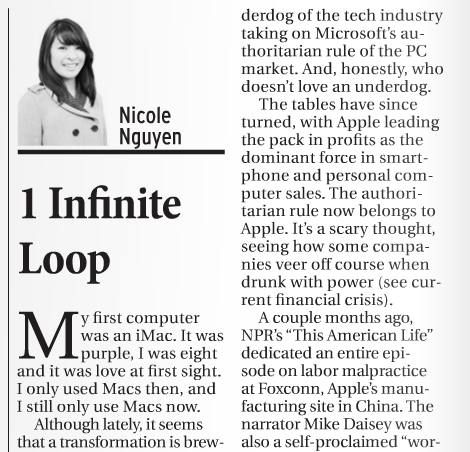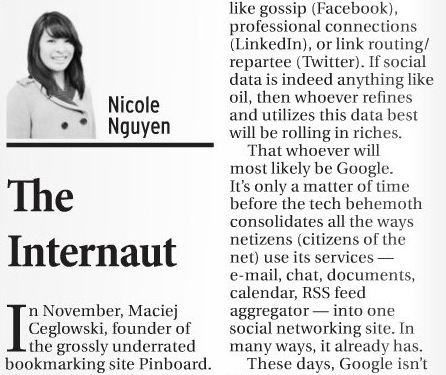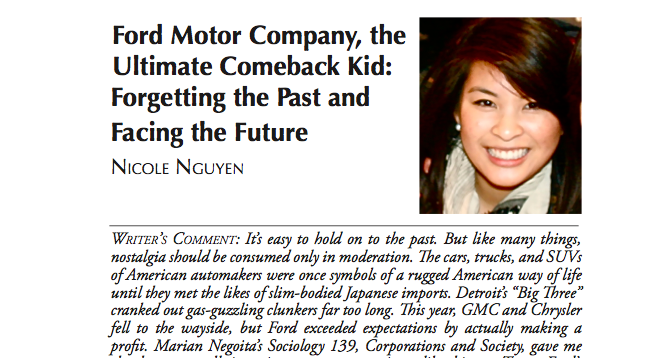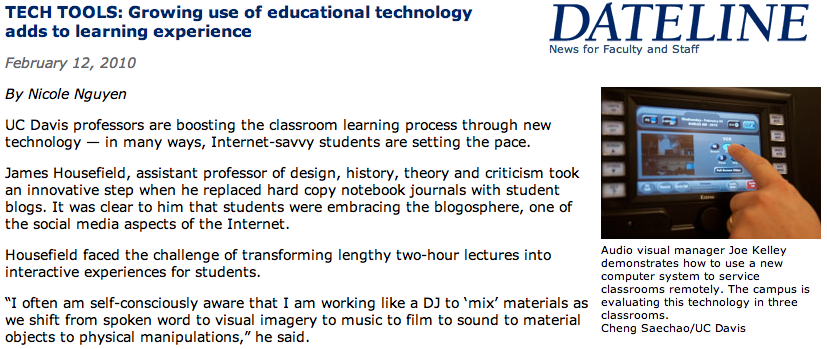Appeared in The California Aggie on March 12, 2012
My first computer was an iMac. It was purple, I was eight and it was love at first sight. I only used Macs then, and I still only use Macs now.
Although lately, it seems that a transformation is brewing within Apple, and my allegiance is not as strong as it once was. Both the company and the industry are moving in a new direction. Last Wednesday, at the new iPad unveiling, CEO Tim Cook declared that we now live in a “post-PC” world, a world of tablets, e-readers and smartphones. It has been less than 20 years since Steve Jobs returned to Apple and built the brand we know today. And yet, the world is already something entirely different.
I’m not sure that it’s the post-PC era yet, but fairly certain that in the near future it will be. Whatever the case, Tim Cook’s prophecy got me thinking: Could I still remain devoted to Apple under new management, in a new era? In a post-Jobs, post-PC world? Is brand allegiance like hereditary politics? Do we just buy into the products and ideas that we grew up with?
Apple, and all that it stood for, undoubtedly shaped my worldview on technology. I had already committed myself to the cult of Mac by the time I had reached reading age and was ready to use computers. It was the same year the “Think Different” campaign was launched, featuring portraits of Ghandi, Einstein and other “round pegs in square holes.”
I went to see if Apple’s company culture lived up to its campaign message for myself. At 1 Infinite Loop Cupertino, California — the address of Apple’s main campus — there aren’t many suits, ties or polished leather shoes. In fact, when I visited, there were none. There was no corporate uniform to speak of. Apple, right down to its dress code, championed individuality above all else.
Apple and its products seemed so contrary to the status quo which, for me, was its main appeal. The company was the scrappy, under-appreciated underdog of the tech industry taking on Microsoft’s authoritarian rule of the PC market. And, honestly, who doesn’t love an underdog.
The tables have since turned, with Apple leading the pack in profits as the dominant force in smartphone and personal computer sales. The authoritarian rule now belongs to Apple. It’s a scary thought, seeing how some companies veer off course when drunk with power (see current financial crisis).
A couple months ago, NPR’s “This American Life” dedicated an entire episode on labor malpractice at Foxconn, Apple’s manufacturing site in China. The narrator Mike Daisey was also a self-proclaimed “worshipper in the cult of Mac.” What Daisey uncovered — the sweatshop conditions, the underage laborers — was disturbing. A week later, The New York Times ran a front page story on the allegations. Apple was in the spotlight, and it didn’t look pretty. It was the first time my devotion had wavered at all.
Marco Arment, creator of the site Instapaper, wrote a blog post on the derogatory term “fanboys” (well, in my case, fangirl) which he defined as someone who is “blindly and irrationally devoted to a product” and “whose opinions and arguments can therefore be completely disregarded”. This quote has been ringing in my ears ever since.
So, I’ve resolved to put an end to my fangirl tendencies and look at technology with some clarity. Two of my friends now have Windows phones which, upon closer inspection, I found to be one of the most beautiful user interfaces I’ve seen in a while. I always thought Apple had a leg up on the competition at the very least in terms of aesthetic. But the Windows phone was so graceful and animated — something I had never associated with Windows, ever. For a moment, I wondered if I had just found an iPhone alternative.
My stubborn commitment to Macs has everything to do with growing up Apple. The platform you started on is probably the platform you’ll return to time and time again.
But now that the platform is changing, and the industry is shifting its attentions to mobile and the web … I think allegiances will too. The post-PC era may just break this one infinite loop.
If the iPhone, iPad or iPod is the apple of your eye, let NICOLE NGUYEN know at niknguyen@ucdavis.edu.



